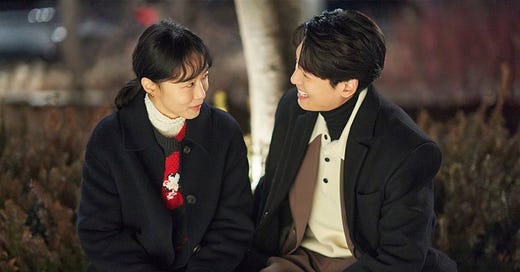Crash Course in Romance (2023) Episodes 15-16
Sigh. I think it’s time that I bid K drama rom coms farewell. It used to be when I started with K dramas they were my immediate go-to genre but these days the appeal isn’t there anymore. Whether it’s me getting rather too old for this kind of indulgent fantasy fulfilment or that the genre is experiencing a right royal pummelling in South Korea, I always end up feeling grumpy about the show at some point. To its credit though Crash Course was a decent watch until Episode 16. I don’t mind admitting from a writing point of view that it’s hard to get the balance right especially when there’s crime elements involved but one would hope that if a writer is courageous enough to include crime elements in a romance drama that it should be followed up by actual consequences. It’s not that I object to happily-ever-after endings but like every kind of resolution on offer, they have to be earned ie. make sense in light of everything we’ve seen previously.
Mawkish would be the word I use to describe the finale. A level of sweetness guaranteed to bring about tooth decay.
By now it must be permissible to talk openly about Ji Dong-hui as the metal ball serial killer. It should come as no big surprise to anyone who paid attention that this affable young man had a darker side. His suicide was a plausible outcome of all his misdeeds once he realised that the man he held in high esteem rejected him and all his efforts in protecting him. What I object to, however, is the messaging accompanying the moment. Unrepentant to the last with no real challenge to his thinking or real acknowledgment of the gravity of his crimes. Dong-hui takes a leap off the hospital roof and instead of remorse for what he’s done, the implication is that he’s essentially a good kid who was betrayed by the people around him. A casualty of the system.
In fact it can be said that nobody should be accorded much responsibility for what they do because it’s the system that compels them to behave them the way they do. This in effect absolves them much or any responsibility for their extreme behaviour because it is simply easier to point the finger at an amorphous entity called “the system”. Hence their contribution to performative activism is over. For now.
Who knows what the intent of the show is but given the finale we got with everyone holding hands and singing ballads of goodwill all throughout, such an interpretation is more than possible. It leaves something of a bitter taste in my mouth that the antagonists of the story get their redemption at such a late hour so that everyone else can go on living happily unencumbered by the past. Lawyer Jang gets her reprieve because Seon-jae has to be with Hae-yi. That family dysfunction that was sledgehammered so relentlessly for most of the show is hand waved over a trial and a family meal. The Lee family is whole and healed… life goes on. A very bitter pill to swallow.
A rogue’s gallery of one dimensional characters all being lavished with redemptive arcs without laying any groundwork. Why show why?
In essence the past 15 episodes are just a bad dream. In the overall scheme there are no real consequences. No one really behaved badly and everything they did was because they were well-intentioned or driven to it by “the system”. But the system is made up of people. Built by people. Perpetuated by people. Accepted by people. That includes helicopter parents who may be well-intentioned. It will take real people to dismantle it over time. The adults are incapable so what… it’s up to the kids? In fact, a really substantive analysis would require a much deeper exploration of the cultural attitudes and values that has fostered this predicament. Without that, nothing will change. It ends up being about tinkering around the edges which is what politicians/bureaucrats love to do. To unpack and undermine the elite narrative that universities are the ticket to a life of untold opportunities. A claim that should be honestly investigated in another drama. But as seen in this shown, it’s an edifice — a sacred cow — that no one has the will to touch.
On hindsight, the leads’ dynamic was the saving grace of this show and the finale even if I didn’t think Jung Kyung-ho and Jeon Do-yeon had much spark between them. Both are acting powerhouses and they certainly put their best foot forward. Thankfully their enthusiasm for the project never faltered. I’m glad Chi-yeol and Haeng-seon got their happily-ever-after (the double proposal had me grinning from cheek to cheek) since the show made a decent case for them to be together but I can’t say the same for all the other random pairings that made absolutely no sense storywise. It was already mind-boggling putting Jae-woo and Yeon-joo together but Geon-hu and Soo-a? What were they smoking in the writers’ room? Were they handing out consolation prizes and participation awards as they made the roll call at the end?
All in all it was a moderately entertaining watch. I doubt I’d be revisiting this ever. It is largely forgettable except as my first encounter with Lee Min-jae who has all the makings of a television star.



